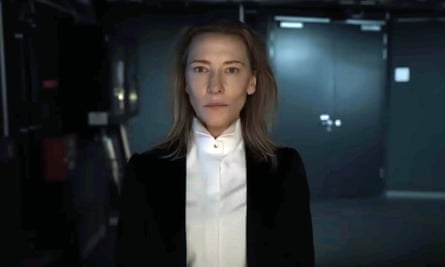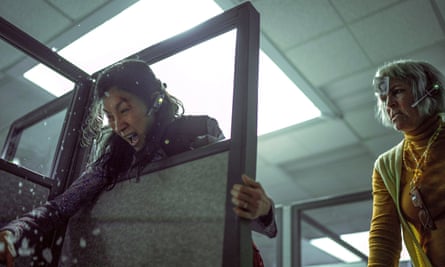First: a great deal of joy in Ireland for its tremendous successes on this year’s Academy Award nomination list. Martin McDonagh’s tragicomedy The Banshees Of Inisherin, about two men falling out in a remote island community at the time of the civil war, has a host of nominations: including best picture with McDonagh getting best director and best screenplay nods, best actor for Colin Farrell, best supporting actor(s) for Brendan Gleeson and Barry Keoghan and best supporting actress, for Kerry Condon. In addition to which, Paul Mescal gets a best actor nomination for his performance in Charlotte Wells’s beautiful father-daughter drama Aftersun; Colm Bairéad’s The Quiet Girl is nominated for best international feature and Tom Berkeley and Ross White’s An Irish Goodbye is nominated for best short. Otherwise, there is some unease at the gravitational pull towards the mainstream: an all-male directing list (Charlotte Wells or Marie Kreutzer could have got in there) and Danielle Deadwyler’s excellent performance in Till is ignored in the best actress list. There has been some haughty online dismissal of Ana de Armas’s nomination for her performance as Marilyn Monroe in Andrew Dominik’s condescending psychodrama Blonde (although the problem is surely with the film rather than De Armas), and a mixed response on social media for the estimable Andrea Riseborough’s best actress nomination for the tough indie drama To Leslie, largely due to a wary response to a celebrity-driven viral campaign. But the always excellent Riseborough certainly shakes things up.
Cate Blanchett naturally takes pole position in the best actress list for her much-acclaimed uber-conductor role in Tár, a female-Furtwängler supernova of problematic power display. However, the best actor list is harder to call – though it could well be that Austin Butler will clinch it for his heartfelt impersonation of Elvis Presley, a performance much admired by the star’s late daughter Lisa Marie Presley.

But once again, the traditional mysterious awards-groupthink causes nomination clusters to form around a handful of films. A few years back, the smashing success of Bong Joon-ho’s family dysfunction drama Parasite caused much commentary about how Korean cinema was going to be highlighted in Hollywood a lot more. But this year, Park Chan-wook’s outstanding Korean drama Decision to Leave got nothing. And Oliver Hermanus’s wonderful film Living, adapted by Kazuo Ishiguro from Kurosawa’s Ikiru was largely overlooked – though there’s a best actor nomination for Bill Nighy. This is, incidentally, not a bumper year for the British, although Roger Deakins will probably get the best cinematography Oscar for his superlative work on Sam Mendes’ underrated Empire of Light. And I wouldn’t bet against British producing legend Jeremy Thomas getting up on stage to accept the best international feature Oscar for the Bressonian drama EO (with its director, Jerzy Skolimowski).
But the big hitter this year is definitely the surreal multiverse dramedy Everything Everywhere All at Once from writer-directors Daniel Kwan and Daniel Scheinert, about a laundromat owner assailed by a vision of alternative existences and competing realities – which has pulled off the vital trick of getting talked about by Academy voters and influencers. I am agnostic about the film itself, and am in a critical minority in feeling that there is something glib and hipstery and (whisper it) tiresome about the film. But it certainly has very strong performing talent, with no fewer than four acting nominations: the much-loved Michelle Yeoh, Jamie Lee Curtis, Stephanie Hsu and Ke Huy Quan.
Behind Everything Everywhere is McDonagh’s wildly popular Banshees, which once again demonstrates McDonagh’s Midas touch for awards-friendly drama, and also Netflix’s searing first world war movie All Quiet on the Western Front, adapted from the classic novel by Erich Maria Remarque, which like Banshees clocks up nine nominations. The Oscar nominations for All Quiet shows that its 14 Bafta nominations were no fluke – and also, I think, is partly attributable to public horror at the trench warfare happening on today’s eastern front: the Russian war on Ukraine.

Otherwise, Todd Field’s magnificent drama Tár, with Blanchett as the tormented maestro gets six nominations and shows that its quasi-European cachet is translating into Hollywood love. Tom Cruise’s box office smash Top Gun: Maverick also gets six – last week the industry learned that Cruise told Field exactly how to market his previous Oscar-winner, In the Bedroom, more than 20 years ago, saving it from producer Harvey Weinstein’s clumsy cuts.
But given that everyone is still worried about no one going to see films in cinemas any more, what about the film that’s outpacing even Cruise at the box office? What about the film that’s keeping the filmgoing habit alive and subsidising all these luxury-prestige products – James Cameron’s Avatar: The Way of Water, featuring weird blue creatures swimming around underwater without needing to hold their breath? Well: it has nominations for best picture, sound, visual effects, production design, though is perhaps only a shoo-in for visual effects and somehow isn’t fashionable enough for awards season. I myself think it’s the sequel that we didn’t need, but Cameron may feel miffed on the night.
It’s an interesting, disparate list: my guess is that Steven Spielberg’s richly warm-hearted autobiography The Fabelmans will get best picture, the Daniels will get director and the acting quartet could be Blanchett, Farrell, Hsu and Gleeson – but De Armas or Riseborough could get a late voting surge.

 1 year ago
74
1 year ago
74










 English (US)
English (US)